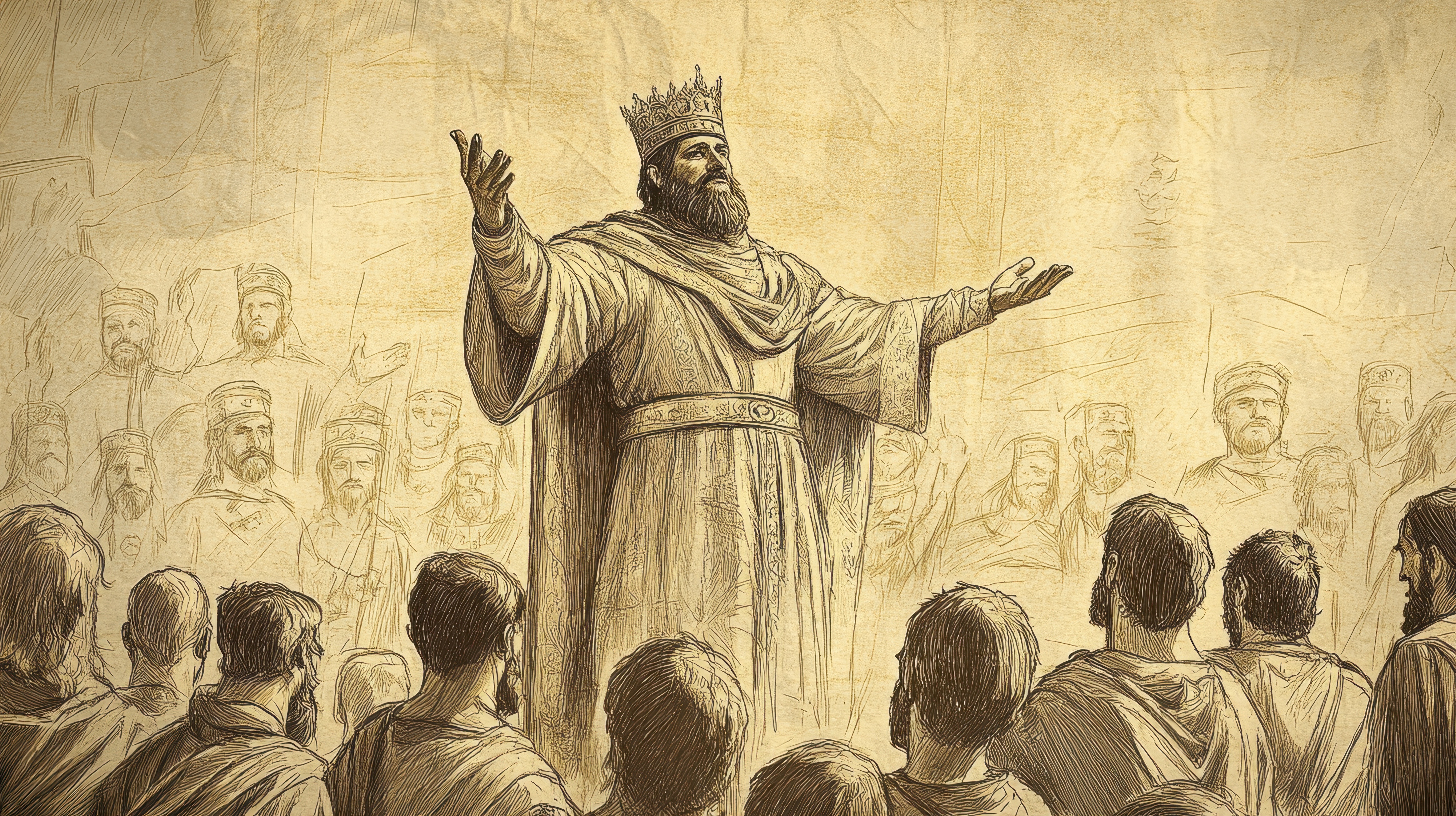2 Kings 15 Jotham

When King Uzziah was struck with leprosy, his son Jotham reigned with him. Now it is Jotham’s turn alone on the throne. He honors God, like his father did.
There is so much that we don’t know about this king. His actions didn’t stand out among his peers. But he was a good king, and a godly king. He wasn’t perfect. He didn’t tear down all the altars that the people had erected throughout Judah. And he was afraid to enter the Temple of the Lord. This last part was probably due to the actions and punishment of his father. Let’s rejoin our story and see where the Spirit takes us today.
♥ ♦ ♥
The day has finally come. Jotham is struggling within himself. He doesn’t know how he is ‘supposed to’ feel about his abba’s death. Sad at his passing and mourning the loss, but there is SO MUCH MORE going on in Jotham’s heart. He is excited and terrified at the same time about becoming king of Judah. He is moving from co-regent, to solo king. “How will I know what to do without my abba advising me.”
Jotham is also struggling with feeling relieved at his abba’s death. For years, his abba suffered from leprosy. It is a painful disease that kept him isolated and full of shame. Jotham could do nothing to ease his suffering, but God could. And he did; finally.
Jotham stands in the doorway of his abba’s house. The one he had built for him when he was struck with leprosy. With torch in hand, he takes one final look around the room. He goes no farther than the threshold with his body, but his eyes drink in the remnants of his abba’s life. The writing desk, the unmade bed, the clothes strewn about because no one saw. All the little things that one takes for granted.
Now this house stands empty. And now it will be burned to the ground to cleanse it of the leprosy of his abba. Jotham steps back and touches the torch to several places then tosses it in through the door. He watches as it catches fire. Once it is fully engulfed, he turns away. There are servants with buckets of water and hand tools ready to extinguish any escaping embers and the ashes, after the house is completely burned.
This isn’t the required way of cleaning a home of one that had leprosy, but it is how Jotham has chosen to do this. He doesn’t want even a single reminder of the separation of his abba to stand. He understands and has accepted the Lord’s judgment of his abba’s sins. But his abba is at rest with his fathers. Now it is time to let Jotham’s heart rest as well.
After the mourning period is complete for Uzziah, Jotham turns to continuing the projects started under his abba’s hands. He continues building Judah’s defenses. He works hard on maintaining good relations with Israel. And he follows the statutes of the Lord.
The only thing Jotham does not do that Uzziah did is enter the House of the Lord. Jotham loves the Lord God of his fathers, but he is afraid to approach him. Seeing his abba’s punishment has put a wall of separation between himself and the physical Temple. He still offers the required sacrifices and personal offerings but these are delivered to the priests at the gate. This is how Jotham has brought his sacrifices since the day his abba fled the Temple.
Jotham is a skilled designer. He spends a significant amount of time in building the walls of Ophel. This strategic embankment is critical to the defense of Jerusalem, should one happen. Jotham knows it is a matter of ‘when’, not ‘if’ for Jerusalem. It is the stronghold of the Lord and bears His name. He wants to protect the House of the Lord and His people. Jotham specifically builds the upper gate of the House of the Lord to access the Orphel in times of trouble.
Jotham doesn’t just focus on those in Jerusalem. He builds cities and towers for the people in the hills and the wooded areas. He wants to protect all of God’s people.
After twelve years of peace and preparation, the time has come. The Assyrians have set their sights on Judah. Reports come to Jotham of the Assyrians massing troops near the shared boarder.
“Ready the troops! We march tonight. Also send a call throughout all of Judah. ‘Thus says the king; “Send me your valiant warriors. It is time to defend the nation of the Lord against the Assyrians.’”
Jotham makes one more call. “Have the high priest meet me at the king’s gate, wearing the ephod.”
When the messenger leaves, Jotham goes into his chambers and washes himself and puts on his armament for battle. He wants to appear before the Lord with clean hands and heart as well as ready to do the work He will send him on.
The high priest is waiting at the king’s gate. Jotham bows before him. “The Assyrians have come against the people of the Lord. Shall I go out and attack them?”
The high priest reaches into the place where the Urmi and Thummim are kept. He put his hand around one stone and pulled it from its place. He opened his hand and it contained the Thummim. “Go up and attack them. The Lord will grant you victory over the Assyrians.”
Jotham stood up to his full height and marched straight to the garrison. He is certain of his course and the outcome. He will follow the Lord. When he reaches the garrison, the troops are in the process of readying their gear for the campaign. Wagons are being loaded with tents and food. The men not busy in this task are assisting one another in putting on the armor that Uzziah had made for them. The coats of mail, helmets, slings, stones, and highly sharpened swords.
The guard notices Jotham and calls to everyone to come to attention. Jotham nods as he looks around, pleased with what he is seeing. He has come to bring them the encouragement they need for war. “I have consulted with the Lord. He promises us victory over the Assyrians!”
The men’s hearts all soar with this news. Were they not at attention, there would be shouts of victory ringing out. “That is all” announces Jotham. “Be ready in two hours.”
As the men are released to complete their preparations, there is a renewed sense of urgency and excitement. They are all eager to see the hand of the Lord in action. And several victory shouts break out within the garrison. Jotham smiles as he hears these as he is walking towards the palace to await the moment of departure.
Jotham bids his family farewell just before leaving. “I will return soon, and in victory. Be prepared to celebrate the deliverance of the Lord when I return.”
Judah’s army marches all night to reach the place across from the Assyrian army. Wearing all the armament, there is no quiet movement of the troops. Above the sound of hundreds of thousands of sandals slapping the earth in unison, there is also the rattle of the coats of mail. Jotham takes note of this, in case they might need to make any sneak attacks or send out spies.
The sound of Judah’s army puts fear into the hearts of the Assyrians. When morning comes, Jotham finds himself across from a trembling foe. Not even a blade has been unsheathed and the Assyrian army is acting as though they are defeated. Their leaders, though, are determined to start this battle.
The trumpets blow from the Assyrian side and their men slowly move forward. The trumpet then sounds in the ranks of Judah and her men surge forth like water released over a damn. And like that water, it flows over every obstacle in front of it, flattening it to the ground. The Assyrian army scatters and retreats in chaos. Judah gives chase and strikes down men all the way back to Ninevah.
Upon arrival at Ninevah, Jotham calls a halt to the forward motion. “Surround the city but do not attack until I give the signal.”
Jotham calls one of the messengers to him. “Take this message to the king of Assyria. ‘Jotham, king of Judah, demands your surrender. If you choose not to surrender, we will attack Ninevah and none will survive. Our Lord has given you into our hands. If you choose wisely to surrender, we will withdraw, and you will pay annually 100 talents of silver, 10,000 cors of wheat, and 10,000 cors of barley. What is your answer? Life or death?’”
As soon as Jotham is done laying out his message, the messenger presents himself at the gate of Ninevah. He pounds upon the door and calls out to the guards behind it. “I have a message from Jotham, king of Judah to the king of the Assyrians.”
After confirming that he is indeed alone at the gate, it is pulled back and he is ushered to the palace to stand before the king. The messenger bows politely to the king, then sets out Jotham’s demands. “What is your answer? Life or death?” the messenger ends.
“I will give you my answer in five minutes” says the king of Assyria.
The messenger steps from the room and the king confers with his advisors.
“What do you think my answer should be?”
“By the simple fact that Jotham himself sends you word, his army has already dispatched ours. We have no protection. No one to repel the forces of Judah. If their God is fighting for them, then we cannot stand. I suggest accepting his terms. They are steep, but not beyond the means of your people to meet them.”
“I agree” announces another and three more do the same.
The king nods then motions for the guard to bring the messenger back in. The messenger looks expectantly to the king. He stands silently and waits for the answer.
“My answer is life. We will do as Jotham, king of Judah, requires.”
“A wise decision my lord. I will take your answer to my king at once.”
The messenger returns to Jotham with the answer. Jotham is pleased with the king’s decision. He fights when necessary, but he does not relish shedding blood.
“Bring me a scribe” orders Jotham.
The scribe takes down the words of the king regarding Assyria’s surrender, the tribute required, and Judah’s withdrawal. Two copies are made, so that each king may have one. After reading it over, Jotham signs both and marks them with his signet ring. “Take these to the king of Assyria and have him sign them as well.”
The messenger returns shortly to Jotham with a copy of the signed covenant. As soon as it is in his hand, Jotham signals to the captain to have the men return to Judah. When they reach the camp of the Assyrians, they plunder it for spoils of war before breaking down their own camp.
Judah’s army returns home with shouts of victory. Jotham takes a tithe of the spoils and has them put into the hands of the priests. “For the Lord and the works of His hands on our behalf.”
A hear later, the first tribute arrives from Ninevah. It is exactly what was demanded. Jotham takes a tenth of this and gives it to the priests to sanctify then distributes it among the people. The remaining portion is put into his treasury. The second year he does the same. The third year, the portion for the Lord is left with the priest to put into the storehouse of the Temple.
Jotham has become very wealthy by the end of the three years. He remains humble though, unlike his abba. But his humble heart does not stop the march of time and the toll being a leader of such a nation puts upon the body. Jotham dies in the night and his son Ahaz takes his place upon the throne.
(to be continued)
I like Jotham’s story. I wish he wasn’t afraid to come before the Lord though. NOTHING in this world compares to personal relationship with the very Creator of ALL things. I don’t know if he consulted the Lord before going into battle, because that implies (in MY mind) a relationship. This is something David did on a regular basis. And he was closer to God than any king ever.
Jotham KNEW the statues of the Lord and walked in them. He didn’t tear down the high places though. The people were still stubborn and refused to abandon their false gods and practices. Judgement is on its way
Father God, THANK YOU for making a way for me to have you in my heart. Thank You for making it possible to have a personal relationship with You. I DO NOT envy the people of the bible. There was definite separation from You during that time. I LOVE being on this side of the promise of salvation.
Keep me walking in Your ways Lord. Show me which ‘battles’ to ‘fight’ and which to leave be. I want Your direction in my life at all times.



